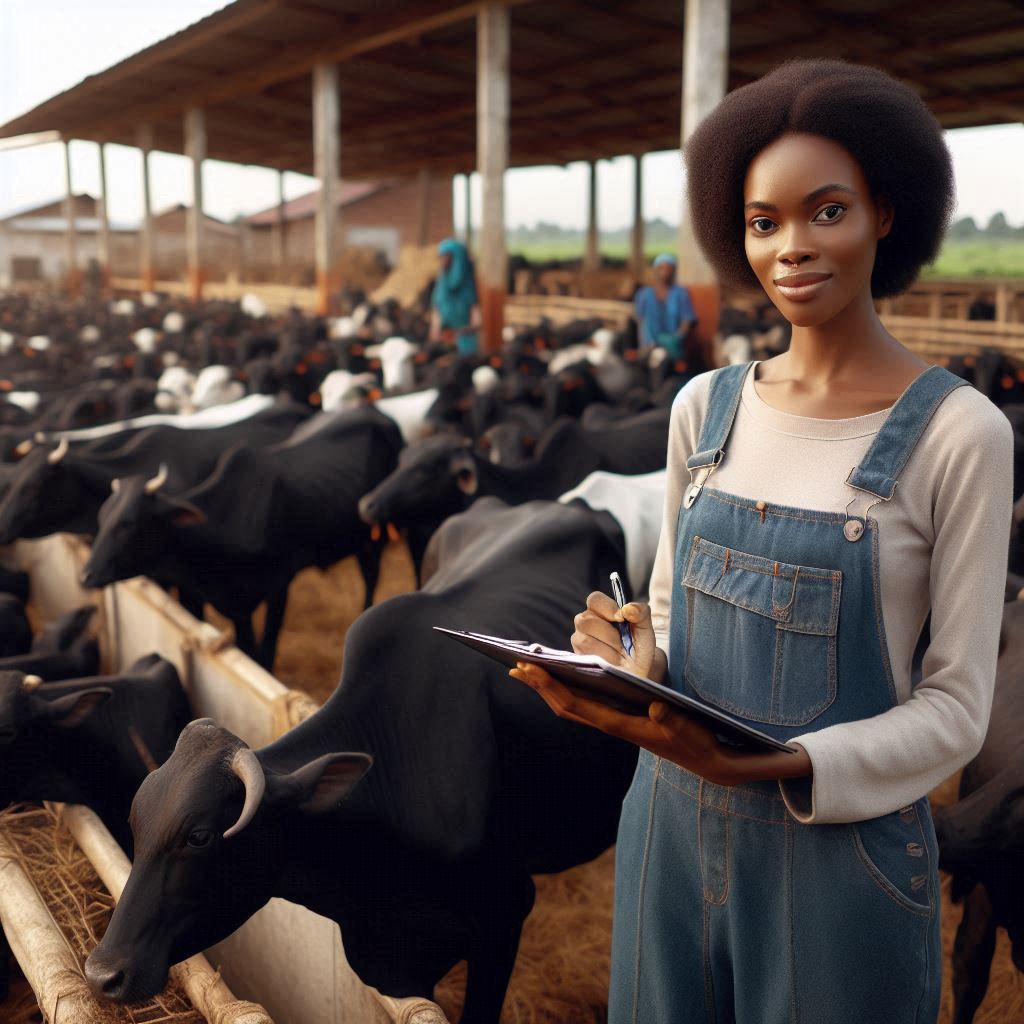Introduction
Livestock production, the practice of raising animals for food, fiber, and other purposes, is a cornerstone of Nigeria’s agricultural sector.
With a rich history deeply rooted in cultural traditions and economic significance, livestock farming contributes significantly to the nation’s food security, employment opportunities, and overall economic development.
In Nigeria, where agriculture serves as a backbone of the economy, livestock production holds particular importance. It provides essential protein sources such as meat, milk, and eggs, meeting the nutritional needs of the population.
Additionally, livestock farming creates livelihoods for millions of Nigerians, particularly in rural areas, where agricultural activities are prevalent.
The purpose of this blog post is to delve into the intricate relationship between government policies and livestock production in Nigeria. We will explore how various policies, regulations, and initiatives formulated by the government influence the dynamics of the livestock sector.
By examining these policies, we aim to gain insights into their impacts on farmers, consumers, and the overall agricultural landscape.
Overview of government policies affecting livestock production
The government plays a crucial role in regulating the livestock industry by implementing policies that shape production practices, ensure animal welfare, protect public health, and support economic growth.
These policies have a significant impact on the way farmers raise livestock, the quality of animal products, and the overall sustainability of the industry.
Role of government in regulating the livestock industry
- Setting standards for animal welfare and quality control
- Monitoring and enforcing regulations to ensure compliance
- Providing financial incentives and support for sustainable practices
- Collaborating with industry stakeholders to develop and implement policies
Key government policies impacting livestock production
- Animal Welfare Laws: Regulations governing the treatment of farm animals
- Food Safety Regulations: Standards for the production and handling of animal products
- Environmental Regulations: Guidelines for managing waste and preventing pollution
- Trade Policies: Rules governing the import and export of livestock and animal products
Recent changes or updates in government policies related to livestock production
- Implementation of stricter animal welfare laws to improve living conditions for livestock
- Introduction of mandatory traceability requirements to enhance food safety
- Adoption of sustainable farming practices in response to climate change concerns
- Revision of trade agreements to promote fair competition and market access
Basically, government policies have a direct impact on the development and growth of the livestock industry.
By creating a regulatory framework that ensures the welfare of animals, the safety of products, and the sustainability of farming practices, governments can support a thriving and responsible livestock production sector.
Read: Forestry and Climate Change: Nigeria’s Response and Education
Impact of government policies on livestock farmers
Government policies wield considerable influence over the operations and livelihoods of livestock farmers in Nigeria. These policies, whether related to land use, trade regulations, or subsidies, directly shape the landscape of livestock production.
Let’s delve into the intricate dynamics and examine the impact of government policies on livestock farmers.
Influence on Operations
Government policies dictate various aspects of livestock farming, including land tenure, access to resources, and production practices. For instance, land-use policies determine the availability of grazing land and access to water sources, crucial for animal husbandry.
Challenges Faced by Livestock Farmers
However, government policies can also pose challenges for livestock farmers. Regulatory burdens, bureaucratic hurdles, and inconsistent enforcement often hinder their operations.
For example, stringent import regulations may limit access to vital inputs such as veterinary drugs and breeding stock.
Examples of Impactful Policies
Several government policies have significantly influenced livestock farmers in Nigeria. The ban on open grazing in some states has forced pastoralists to adopt alternative grazing methods, leading to conflicts and displacement.
Similarly, trade policies, such as tariffs on imported feed ingredients, affect production costs and profitability.
In general, government policies play a pivotal role in shaping the realities faced by livestock farmers in Nigeria. While some policies aim to promote sustainable practices and enhance productivity, others inadvertently create obstacles and exacerbate challenges.
Understanding the nuanced effects of these policies is essential for crafting effective strategies to support the resilience and prosperity of livestock farmers in the country.
Read: Field Work & Practical Training in Nigerian Forestry Schools
Effects of Government Policies on Livestock Health and Welfare
Government policies play a crucial role in shaping the health and welfare of livestock. These policies have a direct impact on the well-being of animals, as well as the quality of products derived from them.
In this section, we will delve into how government regulations and guidelines affect the health and welfare of livestock, and ultimately, the overall quality of livestock products.
Impact on Livestock Health and Welfare
- Government policies have a significant influence on the health and welfare of livestock.
- Regulations often dictate standards for animal care, housing, feeding, and disease prevention.
- Compliance with these policies ensures that livestock are raised in a safe and healthy environment.
- Inadequate policies can lead to poor living conditions, which can result in disease outbreaks and reduced animal welfare.
- Proper implementation of policies can improve the overall health and well-being of livestock.
Regulations and Guidelines for Livestock Health and Welfare
- Government agencies set regulations and guidelines to ensure the proper care of livestock.
- These guidelines cover areas such as nutrition, hygiene, access to clean water, and medical care.
- Veterinarians often play a key role in ensuring that livestock meet the required health standards.
- Procedures for disease control, vaccinations, and emergency response are also outlined in these policies.
- Inspections and audits are conducted to monitor compliance with these regulations.
Impact on the Quality of Livestock Products
- Government policies directly impact the quality of livestock products such as meat, milk, and eggs.
- Healthy livestock are more likely to produce higher-quality products that are safe for consumption.
- Regulations on feed quality, medication use, and processing methods contribute to product quality.
- Consumers are more likely to trust and purchase products that come from well-regulated farms.
- Animal welfare practices also play a role in the perceived quality of livestock products.
Therefore, government policies have a significant influence on the health and welfare of livestock, as well as the quality of products derived from them.
It is essential for policymakers to continue developing and enforcing regulations that prioritize animal well-being and ensure the production of high-quality livestock products.
Read: Nigeria’s Forest Reserves: A Vital Part of Forestry Education

Government support programs for livestock production
Initiatives and programs supporting livestock industry growth
- Subsidies for animal feed and breeding materials
- Grants for modernizing infrastructure in livestock farms
- Veterinary services and healthcare support
- Research and development funding for new technologies
- Training programs for livestock farmers
Effectiveness of government support programs in improving livestock production
- Increased productivity and efficiency in livestock farms
- Better quality of livestock products for consumers
- Improved animal welfare standards
- Enhanced competitiveness of the livestock industry
- Growth and expansion of small-scale livestock businesses
Recommendations for enhancing government support for livestock production
- Increase funding and resources for existing support programs
- Implement policies to address market access challenges
- Promote sustainable practices in livestock farming
- Strengthen collaboration between government agencies and industry stakeholders
- Provide incentives for innovation and technology adoption
Generally, government support programs play a crucial role in promoting the growth and sustainability of the livestock industry.
By enhancing these initiatives and programs, policymakers can further boost livestock production, ensure food security, and contribute to economic development.
It is essential for governments to prioritize the needs of livestock farmers and implement policies that facilitate a conducive environment for the industry to thrive.
Read: Comparing Forestry Curriculum: Nigeria vs. Global Standards
Conclusion
In closing, we have discussed key government policies affecting livestock production in Nigeria.
These policies influence funding, infrastructure, and sustainability in the livestock sector.
Proper implementation of these policies ensures improved livestock health, increased productivity, and better market access for farmers.
Government support plays a crucial role in shaping the future of livestock production.
Effective policies can enhance food security, boost rural economies, and promote sustainable agricultural practices.
It is essential for stakeholders, including farmers, policymakers, and researchers, to understand and engage with these policies.
By actively participating in policy development and implementation, they can ensure that the needs of the livestock sector are adequately addressed.
We must emphasize the importance of continuous dialogue and research in this area.
Further exploration will lead to better strategies, innovative solutions, and more effective policies.
By encouraging ongoing discussion, we can address challenges, harness opportunities, and drive positive change in the livestock sector.
Let’s work together to shape a sustainable and prosperous future for livestock production in Nigeria.
The future of this vital sector depends on our collective efforts and commitment to effective policy implementation.




